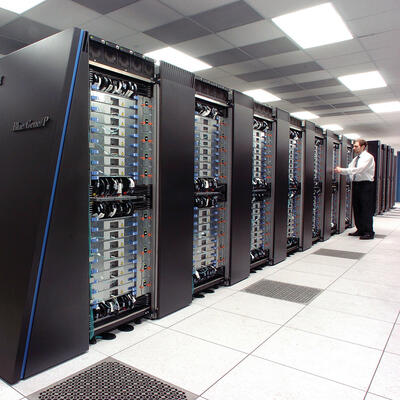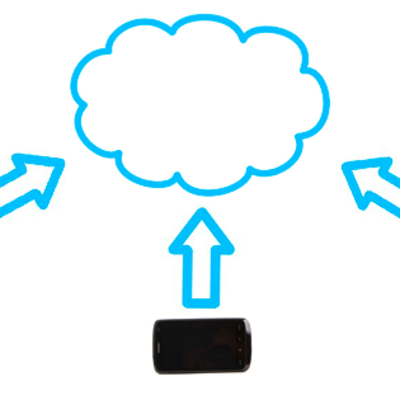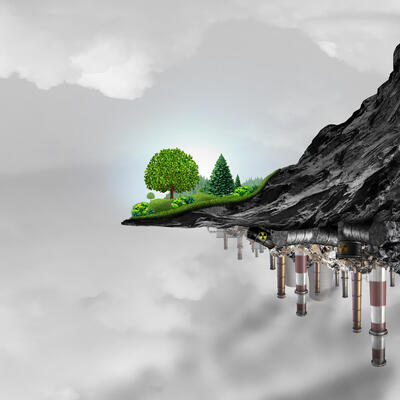
Talk Green, Play Dirty: Corporate America’s Mixed Record
Guests

Emily Atkin
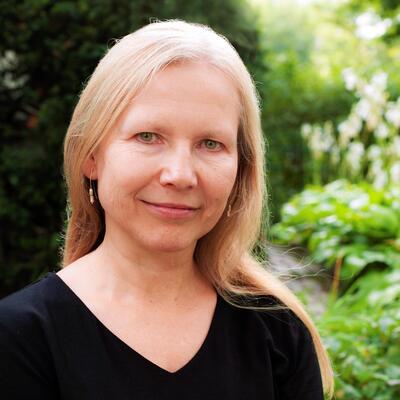
Barbara Freese
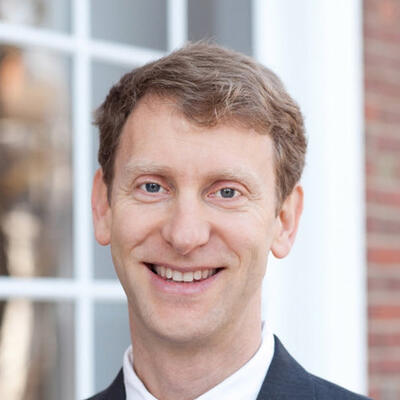
Michael Toffel
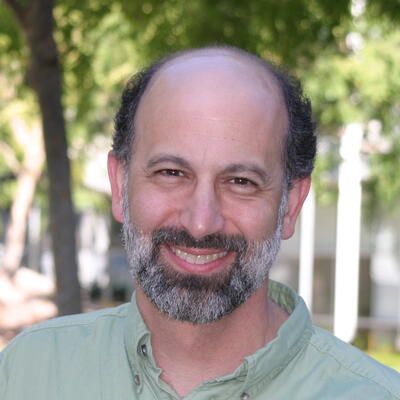
Bill Weihl
Summary
In December 2020, the Center for Climate and Energy Solutions issued a letter calling on President-elect Biden to return to the Paris climate agreement, and work with Congress on ambitious, durable and bipartisan solutions. The letter was signed by 42 American companies, including Amazon, General Motors and Walmart, and called climate action “a business imperative.”
“Corporations are very willing to do things to green their own businesses, but they are less willing to do anything to change the political environment to create the conditions necessary for climate action,” says Emily Atkin, author of the Heated Newsletter.
Questioning science, funding vocal climate denial groups, and encouraging the focus on personal carbon footprints — moving the responsibility from the systemic to the individual — are the preferred tools for shifting responsibility away from industry.
“The corporation I think really is designed to promote denial and to diminish social responsibility and to enhance bias,” says Barbara Freese, Author, Industrial-Strength Denial: Eight Stories of Corporations Defending the Indefensible, from the Slave Trade to Climate Change.
But with more employees holding CEOs accountable and the start of a departure from shareholder-first capitalism, is the role of the corporation shifting? Should we be scrutinizing the climate action plans of tech giants like Salesforce over energy companies like Exxon Mobil?
“What I'm looking for is organizations who are aligning their lobbying and their campaign contributions with all of the work that they're doing inside their organization,” says Mike Toffel, Professor of Environmental Management, Harvard Business School.
But will voluntary action -- even by huge corporations -- ever be enough to fully decarbonize the economy?
“Stan Lee, Spiderman, with great power comes great responsibility,” says Bill Weihl, Former Sustainability Director at Facebook, “These companies have a lot of power. We need them to use it for the common good on climate, not just for their own good.”
Related links:
Climate Rising
HEATED
ClimateVoice
Industrial-Strength Denial: Eight Stories of Corporations Defending the Indefensible
Full Transcript
Greg Dalton: This is Climate One. I’m Greg Dalton. [pause] Questioning (the) science... Funding climate denial groups... Focusing on personal carbon footprints.
Barbara Freese: The corporation I think really is designed to promote denial and to diminish social responsibility and to enhance bias.
Greg Dalton: Some large corporations are working hard to decarbonize their own operations. But is that voluntary action enough?
Emily Atkin: So you're publicly saying that you want Congress to act on climate but you’re donating to make sure that Congress never acts on climate.
Greg Dalton: As more people hold their employers accountable, how will the role of corporations shift?
Bill Weihl: Stan Lee, Spiderman, with great power comes great responsibility. These companies have a lot of power. We need them to use it for the common good on climate, not just for their own good.
Greg Dalton: Talking Green, Playing Dirty in Corporate America. Up next on Climate One.
---
Greg Dalton: Will voluntary action -- even by huge corporations -- ever be enough to (fully) decarbonize the economy? Climate One conversations feature all aspects of the climate emergency: the individual and the systemic, the exciting and the scary. I’m Greg Dalton.
Greg Dalton: In December 2020, the Center for Climate and Energy Solutions issued a letter, calling on President-elect Biden to return to the Paris climate agreement, and work with Congress on ambitious, durable and bipartisan solutions. The letter was signed by 42 American companies, including Amazon, General Motors and Walmart, and called climate action “a business imperative.”
Female voice: Leveraging American investment and innovation, toward the technologies of tomorrow will create jobs, drive growth, and strengthen U.S. competitiveness. Near-term climate actions can contribute significantly to our economic recovery.
Bill Weihl: Companies that are very much pro-climate action, that are acting in their own operations, are mostly silent on public policy.
Greg Dalton: Bill Weihl is Founder and Executive Director of ClimateVoice, and Former Sustainability Director at Facebook. He’ll join us later in the program to talk about how employees are pressing companies to do more than talk about climate.
Barbara Freese: I think that we don't often recognize how important it is to group morale to feel as if you have the moral high ground.
Greg Dalton: We’ll also hear about the history of corporate obstruction from Barbara Freese, author of Industrial-Strength Denial: Eight Stories of Corporations Defending the Indefensible, from the Slave Trade to Climate Change. First, how are companies and their CEOs taking action beyond their corporate walls on climate, racial injustice, and other social issues?
Mike Toffel: What I'm looking for is organizations who are aligning their lobbying and their campaign contributions with all of the work that they're doing inside their organization.
Greg Dalton: Mike Toffel is Professor of Environmental Management at the Harvard Business School, and founder of the Climate Rising podcast. Two years ago, he wrote an article about new CEO activists taking stands on controversial social issues, such as North Carolina's Bathroom Bill, and the DACA program for people who came to this country as children -- issues not obviously related to their bottom line.
Mike Toffel: This is not solar company managers saying we need to price our carbon which everyone would attribute to sort of well, of course they’re saying that that’s in their bottom-line interest. We started seeing companies sort of speaking out on these issues as you mention religious freedom laws or DACA. And one of the things is that CEOs when they speak out on issues that are not obviously related to their bottom line. It's newsworthy. And so that's actually what puts it on the front pages as with the discrimination framing. And we’ve seen this in other areas, right. We’ve seen companies be threatened by customer boycotts and in response “buycotts.” So, Chick-fil-A is probably the most famous example where the head of Chick-fil-A was speaking out against gay marriage. And you had a response from the Mayor of Boston the Mayor of Chicago who said, well, Chick-fil-A may want to rethink their expansion into our markets because that’s not the way we think. There was boycotts of Chick-fil-A by those who opposed the leader’s perspective. But then in response there were what were called “buycotts” people who said let's go organize and get in line. So, there is some opportunity for sort of customer aversion and also customer proclivity to align themselves with some of these CEOs topics.
Greg Dalton: But on climate you found no evidence that CEOs are more credible on climate than celebrities or other messengers. So, if we think about climate what are the incentives and risk and are they effective if they speak out about climate?
Mike Toffel: Yeah, so one of the reasons I got into the whole space of CEO activism in the first place is with the conversation kind of stuck in the U.S. in part driven by different political philosophies but also in part driven by misinformation driven in part by industry like decades of fossil fuel misinformation some think tanks that are promoting this information. CEOs have had played a role of trial; they’ve been trusted for a long time in the U.S. And so it was gonna be interesting to study I thought whether CEOs that they spoke out on behalf of the need for climate regulation both to mitigate the emissions as well as perhaps to invest in some resilience to protect our cities and protect our countryside against the effects of climate change, whether that was going to make a difference in how people thought about the issue. And unlike issues about religious freedom whether that's a discriminatory topic when we tried a whole bunch of different things where we look at whether CEOs spoke out talking about climate change is a problem for the next generation it's a problem of economic equity of limiting growth of moral issue. No matter what we threw at it, it did not sway the public opinions. And that was true also, when we expose people to conditions talking about celebrity speaking about this. So, it seems like on these issues, views are a bit more entrenched than they were on some of the issues about sort of religious freedom and whether that was a discriminatory topic.
Greg Dalton: What are the risks and opportunities for a CEO speaking out on climate. You've written about Jeff Immelt, was CEO of General Electric talking about climate is a good way to sell their wind turbines they’re sort of a win-win you kind of change the rules that benefits your company. That’s kind of pretty much all upside for General Electric. What are the risks and benefits for CEOs stepping out on climate?
Mike Toffel: What we saw is that CEOs tend to do it when their employees force them to do it or when they think it's useful for recruiting new employees. Now the risk is well what about the employees don’t believe this or what about customer basis who don't believe this? So, you have to sort of think about does it align with the corporate values that we have does it align with the culture we want to have. And it’s a little tricky because climate is a long-term problem. It's going to affect people differentially depending on where you live and literally where you live in the city are you in a flood zone or not. Of course, we live across the country as well. But my sense in teaching MBA students as I have for the last almost 15 years is that this generation really wants to work at a company where they feel its mission driven. And part of that mission is making sure society is sort of moving in a direction that's more equal that's more thoughtful that's going to be protective of the American dream and this is an area where climate change really the discussion of climate change could really resonate with those types of employee. And it's not just MBAs I think we’re seeing survey data that folks across the age groups want to work in a company that's mission driven. So, what I'm looking for is organizations who are aligning their lobbying and their campaign contributions with all of the work that they're doing inside their organization. So, we need rating there’s lots of organization that rate the sustainability of companies. We need them to pay attention to what trade associations do they belong to and are they resonating with the individual companies’ corporate statements about climate change. And we need rating agencies to sort of hold them accountable and we need the trade associations to do so .
Greg Dalton: Let’s talk about time frames. Climate is something that is unfolding it's happening faster than scientists predicted, but it unfolds over quite an extended period of time longer than our attention spans longer than a lot of quarterly reports short-term thinking the markets reinforce that. So, if you look at the CEO, they’re incentivized to choose the stock price and do things in that short-term interest they may not align with being more sustainable and acting on energy and climate.
Mike Toffel: Right. So, there are but at the same time CEOs in many industries need to make investments that will have decades of life. You think about power plants for example. So, what we want, and this is why it’s so important for companies who just can't do this on their own. They need to have policies that describe what will the environment be how can we stabilize what the environment will be for decades to come through say a price on carbon. That's needs to be bilateral. We can't just have one party who has 51% trying to impose rules so that when the other party comes in, they just backed them out, right. This is what we saw Obama’s best efforts because they didn't have the cooperation of Congress to do much more as they tried to impose rules which just got turned around. So, we need to sort of build a consensus in the populace to understand that we need to protect our next generation of cities than our next generation companies with more climate stability. So, this is an area where CEOs can play a role. This is why CEOs have to not just say my organization still in but we as a country have to still be in. And this is the pivot that between thinking about what we do as an organization privately like the Amazon example or the Google example and what we do try and set the rules of the game.
Greg Dalton: And you’ve written about Marc Benioff, CEO and cofounder of Salesforce holding dinner saying why activism is part of the CEO job. Yet there's also the cautionary tale of David Crane. David Crane was CEO one of the largest electric utilities in the country. He tried to push more into renewable energy than his company and shareholders were willing to take. And he wrote a very strong letter to shareholders about sort of the moral responsibility children, etc. And I remember interviewing him and saying, you know the worst that can happen to me I’m the CEO of a Fortune 500 companies they can fire me and give me a bunch of money to go away and that's what happened. He got out over his skis further than shareholders in his company was willing to tolerate and these are shareholders are, you know, retired citizens who clip coupons for utilities they rely on that to reliable income. So, what is that cautionary tale, say of David Crane, a CEO who gets too far out gets shown to the door.
Mike Toffel: Well, again I think this is an example of why we need policy rather than organizations to work on their own. There’s a lot of excitement about win wins where you reduce environmental impact and you save money. And to be sure there's plenty of those. But there is also win loses where if you invest in environment or a sustainability activity is gonna cost you more. And so, how do you persuade your shareholders to incur this cost. So maybe you can get customers to pay a premium for an environmental beneficial product. But electricity, you know, you can if you're not the incumbent utility if you have to charge a premium for say green power. And so you see some movements toward that. But if you don't have a customer base who’s willing to pay a premium and the costs that you would bear by going with a greener electricity infrastructure are higher in even in the short run, well then, you’re gonna have a problem like it sounds like the one we’re just describing. So, two things. One is what if you changed the requirements on the utilities so that you are not as the CEO getting out of your skis you are working with the regulators who really have the responsibility to ensure we have a stable environment for the coming decades. And then it's those requirements that utilities would have to meet. So that would be one pivot the other pivot of course now since that story a lot of the costs of renewables have actually plummeted. So, some of that like it might have been successful a decade later. And so sometimes just the timing is off for those types of moves. I am an unsuccessful owner of the now defunct Webvan which was about two decades too early. I remember Webvan with my wife was pregnant they would bring all the heavy stuff all the heavy stuff delivered via Webvan and they were ahead of their time a lot of things. So perhaps David Crane was ahead of his time trying to push renewables.
Greg Dalton: As we wrap up I just want to ask about, you know, looking towards this future where we have potential for bipartisan agreement potentially under a Biden-Harris administration. Business support for something like that would be really critical. I can't think of CEOs are really stepping out there being out visible on climate. So, what do you think about the prospect for corporate leadership and CEO leadership in trying to support bipartisan action on climate in 2021?
Mike Toffel: Well, it's very interesting. I don't know, I’m hoping, I mean it would have been hard to predict 10 years ago that CEOs would be stepping out and talking about religious freedom laws as discriminatory move. So, it’s a little bit hard to predict where these trends are going to go. We’ve got a lot of thinking to do in our country about how do we think about science. We’re seeing right now I think the manifestation of decades of undermining science and climate change, and in tobacco and in asbestos is now rearing its head with COVID. And the idea that wearing masks is a political statement rather than a scientific one is not something I would've forecast five years ago. Yet here we are. So, we have a good number of folks in the country who are rejecting science and viewing it as political. This is exactly where we are with climate. An so we have to figure a way to depoliticize science and get science back to where it used to be in our country. We have managed this tension between having a very religious country and also having a country that has a strong belief in science. And I think we have lost that ability to hold both of those things in our heads at the same time and I don’t think we’re gonna figure out how do we get that back.
Greg Dalton: Mike Toffel is professor of environmental management at Harvard business school and founder of the Climate Rising podcast. Mike Toffel, thanks for coming on Climate One.
Mike Toffel: Thanks for having me.
---
Greg Dalton: You’re listening to a Climate One conversation about corporate and CEO activism. Coming up, how corporations talk green and spend dirty.
Emily Atkin: Corporations are very willing to do things to green their own businesses, but they are less willing to do anything to change the political environment to create the conditions necessary for climate action.
Greg Dalton: That’s up next, when Climate One continues.
---
Greg Dalton: This is Climate One. I’m Greg Dalton. Emily Atkin is an MSNBC contributor, and author of the newsletter HEATED, where she writes about the forces behind past and present inaction on climate. She recently called out some of the corporations that signed a letter, urging President-elect Joe Biden to re-enter the Paris Climate Agreement, and US lawmakers to enact ambitious climate solutions.
Emily Atkin: I was just curious if any of those public companies that made these public facing grand statements of wanting climate action in Congress, you know, well who are they donating to in Congress who are they trying to get reelected. And I found that six of them are actively donating to the campaigns of David Perdue and Kelly Loeffler, who are the two Republican candidates running in the Georgia Senate runoff elections. Both have gone on record being really hostile to climate change science, not to mention climate change regulation. So, it’s sort of like so you're publicly saying that you want Congress to act on climate but you’re donating to make sure that Congress never acts on climate. Why? And myself and my co-reporter Judd Legum of the newsletter Popular Information, you know, we’ve reached out to all of these companies and either didn't get a response or the responses that we got were very confusing.
Greg Dalton: So, you’ve been calling out these companies for talking green and spending dirty. Part of that is green trolling I haven’t heard of this until I read your column in HEATED. What is green trolling?
Emily Atkin: Well, trolling is when you are on the Internet and somebody says something that you don't agree with or you think is stupid or hypocritical in some way. And then you just kind of call them out and make fun of them. And green trolling is doing that in service of an environmental issue. Mary Heglar who writes the climate change newsletter Hot Take, coins the term and she basically said that green trolling is a response to greenwashing which is what corporations who talk green and spend dirty do. It's a green wash. It's the public relations effort to make them look environmentally friendly when they are doing alarmingly harmful things. So, if you see a corporation on Twitter or in Facebook on Instagram in any social media, any two-way social media platform where you can talk back to a corporation, you see them saying something like, our sustainability is so awesome. Mary says is that you should green troll them you should reply to them and be like oh really what about this, you know, and spam them with links and stuff like that. So, she’s really launched a movement to get people to do that.
Greg Dalton: Right. And I’ve seen a couple of tweets like energy company said, what are you willing to do or give up? And she was like right back, what are you willing to do or change? Right back at you in real time, whereas I think the point is that a lot of PR and greenwashing is done through slick ads and kind of a one-way channel. And social media provides opportunity for I guess real-time fact checking and calling BS on these companies.
Emily Atkin: Right. And that's what I mean by a two-way conversation, right. When you see an ad on TV from Chevron being like we are investing so much in biofuels and wind energy and we are partner in the climate crisis. All you can do is yell at your TV and say no you’re not, and that doesn't really do anything. But on social media, that's two-way platform you can talk back and anyone who sees that will also see what you say. And so, in real time, you can expose for somebody else who might not realize what's the hypocrisy that you feel is going on and then you know someone can make their own decision. And that's actually really that's more powerful than you might think in terms of how bad that is for corporations that are greenwashing.
Greg Dalton: What’s your message to people who are working in a big corporation that does some good things some bad things, they’re not really deciding the climate policy? What about people working inside corporate America?
Emily Atkin: I mean I think that the best thing that people working inside corporate America who want to see their corporations stop doing environmentally bad things from the inside if their efforts on the inside aren't working, you should leak to journalists. I'm serious. No, I'm really serious because we depend on courageous people from the inside of corporations to tell us what's going on because everything that we get from corporations is basically, you know, it's a PR cover and it's really hard to discern what the truth is, and be able to convey that truth to the public. The closest thing we have to truth is when it's a public company and we can listen to investor calls and when investors ask tough questions and CEOs and executives are forced to answer those questions, then that's when we start to get a glimpse. But even on those calls, the CEOs and executive give, they give PR like answers and maybe they'll lose investors from it and maybe they won't. But the outcome is that I still don't know what the truth is of what's going on at this company and therefore the public doesn't know either. So, if you're working at a company that's doing something really, you know, messed up and nothing you can do from the inside can change it. Find a journalist you trust and let them know about it and we’ll figure out a way to make it so that you are, you know you're not fired.
Greg Dalton: Emily Atkin is author of the HEATED newsletter and a contributor at MSNBC. Thanks for joining us on Climate One.
Emily Atkin: Thank you for having me.
Greg Dalton: You’re listening to Climate One. I’m Greg Dalton. Bill Weihl is a computer scientist and former chief of Sustainability at Google. He’s also Founder and Executive Director of ClimateVoice, which helps employees push their companies not only to green their own operations, but also to advocate for broader policy changes.
Bill Weihl: Companies like my employers Google and Facebook and many others are doing amazing work and showing amazing leadership in decarbonizing their own operations, and even today, decarbonizing their supply chains. And we need to decarbonize much faster, much greater speed and at much greater scale across the entire economy. That takes much more than individual voluntary action by individuals like you and me or anyone listening or individual companies it takes economy wide action. And the big gap that the I and a number of others see in political support for climate policy is companies that are very much pro-climate action that are acting in their own operations but they are mostly silent on public policy. So, what I have embarked on and with a number of other people is an effort to get those companies to speak up on policy and the way we’re doing that is by educating and mobilizing the workforce.
Greg Dalton: So, we need policy and we need to get policy we need corporate support because they held so much influence in our legislative process. And to get corporate support you’re going to the companies. Why are you focusing on tech companies rather than oil and gas companies?
Bill Weihl: There are a lot of people focused on oil and gas companies. And honestly, I think some of their employees are already quite active. I think the oil and gas companies are hard to move because climate action is a threat to their basic business model and their revenue and their profit. And when they lobby on things it’s mostly obstruction and delay. On the other side the nonfossil fuel companies their businesses are not directly threatened by climate action. Sometimes they aren’t particularly helped by climate action. But if you look at the political balance of power on climate and the amount of money, the fossil fuel industry spent decades amassing political power and kind of cementing political power. So, to counter that we need more political power. So, I think there are people who are working to get the fossil fuel industry to be less bad, and I think that's really important. Nobody else has been working I think the way we are to try to get other businesses to be much better to move them from what I would characterize as good to being great on climate. And to get them to use their considerable influence to counter the influence of the fossil fuel industry.
Greg Dalton: Corporations are tribes with power structures, behavioral norms, rewards and punishments they’re not democracies. So how do you think that employees inside companies can make them stronger advocates for climate action?
Bill Weihl: Well, in the old days back when you and I were young and before that there were these things called unions which still exist. And in some sectors some businesses some kinds of jobs are still really important for employees to exercise power. In the tech industry in the most professional jobs that require college degrees and so on, unions are not the way that employees exercise power. And I think that employees are just beginning in the last small number of years professional employees they’re just beginning to understand that they actually have a lot of power. They understand that these companies need the employees in some ways almost more than the employees need them. It might not be quite as true this year with the economy suffering because of COVID, but even then, you know, I saw recently Amazon announced they have something like 33,000 open job positions. And these are not warehouse positions there they probably have hundreds of thousands open at this point, given the way their business has gone this year. They have 33,000 open engineering or technical and corporate professional positions. I mean that's extraordinary. And the other major tech companies and maybe not quite the same numbers but not that far off. So they are hiring and they are competing fiercely for top talent, which means if top talent expresses a strong opinion and says we really want to work for a company that is all in on climate that is doing everything it can to help us all avoid the like potentially catastrophic impacts of climate change they’re gonna listen. And we have seen examples where companies have responded to employees at some level, pressuring them, encouraging them, pushing them to behave differently. And that's true in public policy and is true in their operations.
Greg Dalton: You’re talking about marriage equality. Marriage equality is the example that often comes up there where there is pressure on companies. Look if you want the best and the brightest of today, you need to and Salesforce went to bat when Indiana and other places where. So, how is marriage equality an example of what you think might happen on climate?
Bill Weihl: Right. So, I think it's actually it's not, there are differences, but there are a lot of similarities. So, 10 years ago you had hundreds of companies who were very progressive in their internal operational policies on LGBT rights. Equal benefits for employees and domestic partnerships, you know, this was back before marriage equality was the law of the land. Policies expressly prohibiting discrimination hiring or promotion or who they serve, but it was all about their own operations. And over the course of two or three years that shifted dramatically and many of those companies went to being very strong advocates for the kinds of social policies that would promote equality and prohibit discrimination across society. They did that because employees made clear they really cared, and they felt it was time for the companies to not just walk the walk internally but to talk the talk externally and use their influence. And it was clear the feeling about all this on the part of college students that the sort of future workforce had shifted in a way that for them it was a basic civil rights issue. And outside groups like the human rights campaign threaten the companies that if they didn't step up and really active strong advocates that they would be called out publicly for being complicit. And the companies understood that that would hurt their ability to hire the next generation of workers.
Greg Dalton: So, on climate we’ve seen walkouts recently with Google and Amazon another some big employee walkout putting pressure do more which was a first. And Jeff Bezos pledged $10 billion to address climate disruption. Amazon says it will achieve net zero carbon emissions by 2040. Other companies including Best Buy, Mercedes and Verizon have joined that effort. Would that have happened without employee pressure and is it greenwashing?
Bill Weihl: I think with some of these companies, it would've happened without the pressure. I think it probably would've been slower. And I think some of these things might not have happened at all. I honestly think it's real and they are what they've said they're going to do they plan to do. Some of it they don't entirely know how they're going to do it and I think that's okay. These problems are hard. When I was at Google and we decided we’re gonna be carbon neutral and we’re going to over time move to 100% clean energy. We didn't know how to do that. We believed we could. We didn't entirely know how. But the question of is it greenwashing I mean there are certainly are companies that put things out there that sound good but don't mean much or they put out targets and then never do anything about them. And that is I would argue greenwashing. I think what these companies are doing is real. They really are reducing emissions that's really important. But to my mind, that’s the leadership we've needed from them for the last decade. What we need for the next decade to get the change we need at the speed and scale we need it is not just voluntary action as bold as it might be by individual companies. We need economy wide action. So, having a company go carbon neutral by 2040, that's great. We need the whole economy to be carbon neutral by 2050.
Greg Dalton: And there was a push in California one of the most ambitious bills to get California to be 100% renewable energy that was once thought unreachable or far away. Where were tech companies when many of them their home state was considering legislation to go on 100% renewable energy, where was big tech?
Bill Weihl: Well, I will say so that bill was called SB 100 it was just over two years ago, it passed. And so, you know if you're a legislative policy wonk you’ll say it's a win we won, let’s move on. But if you're worried about how do we get more of this kind of thing to happen in the future it’s important to look at the dynamics of how close was it, it in fact almost failed so why was it so close. Who supported it, who didn’t? How can we get more support behind similar things in the future? So, it almost failed it is an example of one of a number of state policies in the last few years where business support has really helped make the difference and helped it pass. So, there were 30 plus companies that supported SB 100 very vocally. Salesforce and Adobe and I think Autodesk supported none of the other big tech company supported at least not where there's any public record. Maybe they lobbied privately behind the scenes, we don't know. They made no public statements about it. And they all have their own internal 100% clean energy commitment. So, for three of the big five tech companies here was their home state wanting to make the same commitment they had made and they were silent. And I think that's a problem. If we really want to solve climate change those with enormous power need to use it to help solve it. I think, you know, Stan Lee, Spiderman, with great power comes great responsibility. These companies have a lot of power. We need them to use it for the common good on climate, not just for their own good. And employees have caused companies to change behavior on LGBT rights. They caused Google by speaking out cause Google to basically back away from these custom AI solutions for oil and gas that they were engaged in. So, employees and students do have –
Greg Dalton: Which is walking away from money.
Bill Weihl: Walking away from real money, right. So, employees do have the power to move companies but if you think about it that is very much a capitalist lever. It's saying, look, you may be walking away from revenue, but the alternative is if you don't do this, you’re gonna have a hard time hiring or retaining employees. And if that's the case you’re gonna have a hard time actually growing your business, which is gonna hurt your bottom line. So, it provides a direct bottom line impact to doing this whereas without the employee pressure and the student pressure. There's no risk to companies for staying silent. And so naturally they have tended to stay silent because they do see risk when they speak up. There is political risk. So that's what we’re trying to change is that kind the balance of risk-benefit in that equation.
Greg Dalton: And one way that companies have been able to say things publicly is they’ve been able to use the U.S. Chamber of Commerce as a shield to do their lobbying. So how did you and others hope to influence the U.S. Chamber of Commerce under a Biden-Harris administration with a split Congress, where presumably when the politics are really tight that business lobby is gonna be very important to getting anything done.
Bill Weihl: Well, there are two things. One is that some of the big companies that are members of the U.S. chamber today when they’re silent on an issue and the chamber is vocal, along with the oil and gas companies and the chamber in the oil and gas companies are lobbying against whatever climate policy and everyone else is silent. Then you got the dominant almost the only business voice is pushing for delay and obstruction. So, if we can get those climate friendly companies to speak up. That will help counter the voice of the chamber and oil companies, even if the chamber is still saying the same kind of thing. The other place to push is to get the chamber to change. And it has begun to change its change its rhetoric its statements about climate, but it hasn't yet changed the way it's lobbying. And we think there's an opportunity given the shift in the economy as you said, you know, Apple I think is worth five times Exxon now. The five big tech companies are somewhere between 20 and 30% of the S&P 500 or something like that. I mean it's crazy how big they become. They have a lot of potential power in the chamber. They mostly have not exercised. They’ve used the chamber as a place to get value on the things they really care about and the fossil fuel industry is on the same. That we won't need to make them care about climate in a way where they change what the chamber is doing. So that's part of what we are trying to do with Climate Voice is to get companies, not just to lobby directly, but to align their trade associations with what we need on climate. We don't have five years for gradual change. We need to make some change pretty quickly.
Greg Dalton: Bill Weihl is Founder and Executive Director of Climate Voice and former Director of Sustainability at Facebook. Bill, thank you for sharing your insights with us on Climate One.
Bill Weihl: Oh, it’s a pleasure, Greg, as always.
---
Greg Dalton: The U.S. Chamber of Commerce didn’t respond to requests for comment. You're listening to Climate One, and we’re talking about the changing role of corporations in the climate conversation. Coming up, how corporate deniers project their own strategies and motivations, onto the people concerned about a destabilized climate.
Barbara Freese: Those who are worried about climate change, they’re in fact the greedy ones. They’re just fear mongering just trying to raise fears in others. They have this extreme ulterior political motive.
Greg Dalton: That’s up next, when Climate One continues.
---
Greg Dalton: This is Climate One. I’m Greg Dalton. Barbara Freese is an environmental attorney and the author of Industrial-Strength Denial: Eight Stories of Corporations Defending the Indefensible from the Slave Trade to Climate Change. She also served as an Assistant Attorney General of Minnesota. Beginning in 1995, she remembers encountering coal industry executives and others, with what she calls “jaw-dropping levels of denial of mountains of scientific evidence about climate change.” And yet she found herself unable to write them off as evil or irrational.
Barbara Freese: Sure. Well, this was when as you noted, I was a Minnesota Assistant Attorney General. We had a proceeding in Minnesota where the coal industry brought certain scientific witnesses to testify to tell us we did not need to worry about climate change. In fact, it would probably be a good thing. We probably enjoy it if it happened at all and all of those scientists and we’re talking here about the global scientific establishment on which the entire world had relied in putting together the framework convention on climate change. But all of those scientists were untrustworthy because they were politically biased or financially biased, maybe even religiously biased. It was actually fairly tame compared to what we have heard since and to what some of the groups industry has funded have been willing to say about the motives of those concerned about climate change. But that's what I confronted and it just struck me as so bizarrely, well, almost suicidal from a civilizational standpoint to ignore these risks. And that made me wonder, you know, what's really going on with these people who seem fairly normal, in all other respects. And that's really what got me looking at many other industries throughout history who had similarly reflected these kinds of dangerous denials and seeing similarities among those industries.
Greg Dalton: Right. And lot of these people are highly intelligent. I know some highly intelligent people who if not deny they certainly dismiss or diminish climate change. So, if it’s not pure economic interest, is it because -- what drives it, maybe there’s a little bit of economic self-interest but what else is shaping this?
Barbara Freese: Well, it is tribalism, which, you know, I've come to see not as something that we occasionally get into, but as our natural state. And if we’re not working to overcome it, we divide the world into us versus them, and that immediately influences how we think about reality and how we perceive the motives of those who are not us. There is the distant impact that comes with climate change the fact that it's going to be happening so globally and so far away and it is so hard to actually pin responsibility on any given individual. There is certainly the ideology of the free market that is really making it very difficult to build any kind of a social consensus to take action. And we’ve seen that build more and more really since the 80s and 90s. And, you know, one thing that we've seen so much of from the fossil fuel industry is what I called distrust building, right. Where you know, instead of the trust building exercises that every corporate retreat has it is I think a very conscious and phenomenally successful effort to build distrust in mainstream science, mainstream media government certainly any government attempts to regulate academia and generally expertise. So, I think you got all of these things combining to make climate denial such a powerful force makes it easy for the industry and make it incredibly successful. If you measure it by how well it has penetrated the public opinion and especially if you measure it by how well it has captured politics in this country and altered policy.
Greg Dalton: And smoking is often cited as kind of one of the blueprints for kind of how to conduct denial campaign. So how much has oil learned from tobacco?
Barbara Freese: Yeah, I think the fossil fuel industry has learned a lot from the tobacco industry and of course the tobacco industry had kept it up, kept the denial up for so long that they had a chance to explore and take advantage of lots of different techniques. One of the things that the tobacco industry frequently did of course was use front groups or pay writers to write things not making it clear that they were in the pay of the Tobacco Institute. And the use of front groups has been done very effectively by the fossil fuel industry to promote climate denial. One of the things that the tobacco industry did was always keep the burden of proof on its critics so that you know the conversation was skewed from the very beginning where the industry did not have to prove safety. Its critics had to prove danger and the industry could perpetually peck away at it. The fossil fuel industry has very much done that. And then I think you can draw some pretty direct links between the tobacco industry's attempt really starting at least in the 1980s to try to diminish the credibility of the government. In 1986 the Tobacco Institute, which was already a poster child for corporate denial called for the investigation of the Surgeon General for scientific censorship, arguing that the integrity of science what’s at stake in the Tobacco Institute who was going to defend it. You know, that was something I think people laughed off at the time but after years and years of groups funded some by the Tobacco Institute, some by lots of other industries trying to avoid regulation. Lots of groups claiming junk science and saying that you cannot trust the government or mainstream scientists or academia. That I think really has had an effect and I don't think it has increased credibility of industry, but it has decreased credibility in government and in expertise generally. And I think that has very much led to our political polarization of today.
Greg Dalton: It gets to one of the interesting parts of the book that I really appreciated, which is that on projection. And projection is a concept developed by Sigmund Freud when people deny unconscious qualities, positive or negative about themselves and attribute them to others. It’s associated with blame shifting you write about companies projecting greed and hoaxes to others. How does this play out other than saying we should investigate the Surgeon General?
Barbara Freese: Right. Well, I think the tobacco industry did pioneer that, as so many other forms of denial. But in the fossil fuel industry in particular and the groups they fund, they have been credibly accused of a lot of things, like for example being motivated by money. Well, one of the claims they make is that those who are worried about climate change they’re in fact the greedy ones and they are doing it because they simply want to get scientific grant money. I mean it’s pretty astonishing because of course it requires us to believe that these scientists have just gone rogue and have stayed rogue for some 30, 40 years in the conspiracy that is global. And that all of these people choose to use their hard-won learning to study a fake problem rather than to actually focus on something that's real. That is one of the most astonishing forms of projection. Another thing that astonished me was the claims that those concerned about climate change have this extreme ulterior political motive when in fact many of the groups who are most vocal and frankly unhinged when it comes to their climate denial are strongly associated with the most extreme form of market fundamentalism and in market libertarianism to the point where they advocate dismantling pretty much all of the environmental and consumer protections that have been put in place in recent decades. And minimizing the role of government generally and trusting more to unfettered market forces so that's the second form of projection. Another one of course is claims that people concerned about climate change, or just fear mongering just trying to raise fears in others, whether they believe in themselves. Another form of projection I think are the claims that the climate scientists who are effectively denying the risk are being subjected to unfair persecution they sort of want to portray themselves as these valiant Galileo figures who are standing up against an orthodoxy. In fact, the political persecution has actually been against the climate scientists, many of whom have had tremendous opposition lawsuits challenges trying to obtain all of their emails and whatnot. So, I think the political persecution goes better the other direction, but it is yet another example of projection.
Greg Dalton: Climate is perfectly designed for the weakness of human cognition it’s incremental, it’s indirect. The proverbial frog in the boiling water who doesn't notice that it doesn't get out in time before it dies. But you're writing about denial as a social phenomenon comes from a different angle that I appreciated. You say that if a super villain wanted to design a society that would encourage people to impose grave risks on each other and their home the society the villain would design would look a lot like the modern corporate dominated global economy that we have. Explain what you mean by that.
Barbara Freese: Well, part of it of course, is tribalism, as we've been discussing, and the corporation is a tribe effectively in competition with other tribes. So, I think it dips right into that very ancient primitive sense of tribalism with which we evolved. It is an artificial human that’s what corporation what “corpus” comes from the Latin word for body that allows people to shift moral responsibility away from themselves and onto the corporation. Of course, major corporations have tremendous division of labor, which is one of the reasons why people don't feel socially responsible for its consequences. But the corporation is unique in that it is also designed to protect its owners from liability, which is to say from social responsibilities. So, the limited liability that is built into every corporation means that the shareholders don't have to feel particularly responsible for the harm the corporation may do. They certainly don't have to feel legally responsible and they're so distant and they don't know what's going on most of the times anyway that they're not likely to feel responsible. Management of the corporation isn't going to feel too responsible because they've been told that their primary role is to maximize shareholder profits. So, to the extent that they are thinking about impacts to a larger group they are thinking more likely about their shareholders than about society. Those lower on the totem pole aren’t going to feel particularly responsible for the negative consequences of what they do because they will have ceded that responsibility to management. So, the corporation I think really is designed to promote denial and to diminish social responsibility and to enhance bias.
Greg Dalton: So, what's the solution? You're saying that corporations are tribes they’re basically organizing entity for society these days. Do you think we need to dramatically change the corporate form? Do we need to really dramatically change capitalism?
Barbara Freese: Well, I think it's helpful to recognize that this is a big problem with capitalism. The way I normally think about this is that if we could reform corporation someday to make them less prone to denial and less willing to harm society and other humans that would be great. I don't know how to do that. I think it'll take a long time to figure that out and I applaud those who are experimenting with ways to build more socially responsible corporations. Right now, I think we simply have to recognize that corporations are a powerful force that is too powerful in terms of controlling our democracy and to try to push back against corporate denial through the methods that have worked in the past. Through social activism through attentive independent media through independent science through lawsuits and medical groups getting involved in pointing out medical concerns. Through state and federal legislatures holding hearings ultimately passing laws and then putting in place agencies to enforce those laws. Because of course the industries are in it for the long haul and they can maintain a campaign of denial for decades. And so, we need I believe something equally institutionalized to keep track of that and push back against that and try to keep promoting independent science and independent analysis of the data rather than just getting what we hear from the industry.
Greg Dalton: Barbara Freese, thank you so much for coming on Climate One.
Barbara Freese: Thank you, Greg. I appreciate the conversation.
---
Greg Dalton: Barbara Freese is an environmental attorney and the author of Industrial-Strength Denial: Eight Stories of Corporations Defending the Indefensible from the Slave Trade to Climate Change. To hear more Climate One conversations, subscribe to our podcast on Apple Podcasts, Spotify or wherever you get your pods. Please help us get people talking more about climate by giving us a rating or review. It really does help advance the climate conversation.
Greg Dalton: Kelli Pennington directs our audience engagement. Tyler Reed is our producer. Sara-Katherine Coxon is the strategy and content manager. Steve Fox is director of advancement. Devon Strolovitch edited the program. Our audio team is Mark Kirchner, Arnav Gupta, and Andrew Stelzer. Dr. Gloria Duffy is CEO of The Commonwealth Club of California, where our program originates. [pause] I’m Greg Dalton.
